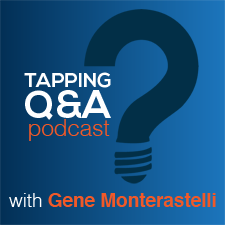[Note: This is part 2 of our conversation. Listen to part 1 here.]
I am guessing as you read the title of this week's podcast you are thinking, “Luck is an odd thing to tap for. They say try it on anything, but luck… really?”
I would agree with you. When my friend and EFT Master Rue Hass recommended this as the topic for our conversation I was curious.
In the end the conversation turned out to be so fruitful that I needed to split it into two parts.
When Rue is talking about luck she is talking about how we access the opportunities around us to move towards our goals. Even though I personally wouldn't use the word luck to describe what she is talking about you will hear in our conversation that I do agree with her disposition.
You will find this conversation in contrast to most of the conversation around an attraction (and law of attraction) world view.
 Rue Hass |
Guest: Rue Hass
Contact Info: IntuitiveMentoring.com, rue (at) intuitivementoring (dot) com
How Rue describes herself: When I first meet a new client/customer/co-creative partner, I walk them through an interesting process of understanding their life as a story. It concludes with asking them to consider what they want their life to leave in the world as a legacy. How do they want the world to be a better place for their having been in it?
When I contemplate this in myself, and ask, “What do I want to focus on in this phase of my life, as a culmination of everything I have learned and gained?”, what emerges for me is the concept of “spiritual eldering.” This impulse finds expression in my work with individuals and local groups, inviting and assisting people and communities to move into a sense of the real transformative power of their spiritual Presence in the world.
I particularly like to work with young people, adolescents and young adults as a mentor/coach. I have always been drawn to the kind of kid who might find him/herself in trouble in school, academically or socially, but who on the inside is bright, sensitive, perceptive, intuitive, often artistic or athletic, deep hearted and imaginative, and who just doesn’t fit the norm. I want to make it easier for these young people to find their place in the world. I think they are here to save it.
Make sure you check out all of Rue's guest articles and podcasts on Tapping Q and A.
Being Open To What Is Around You
Are you looking for help to being exactly what Rue talks about into your life? Are you ready to be able to access the opportunities that are around you every day? The Ruach Center was designed to help you do just that. There are over 150 resources to help you get clear about what you want and to help you access the opportunities around you. Take a few moments to check it out. You will be glad you did.


 Guest: Deborah D. Miller PhD
Guest: Deborah D. Miller PhD



 In a recent
In a recent